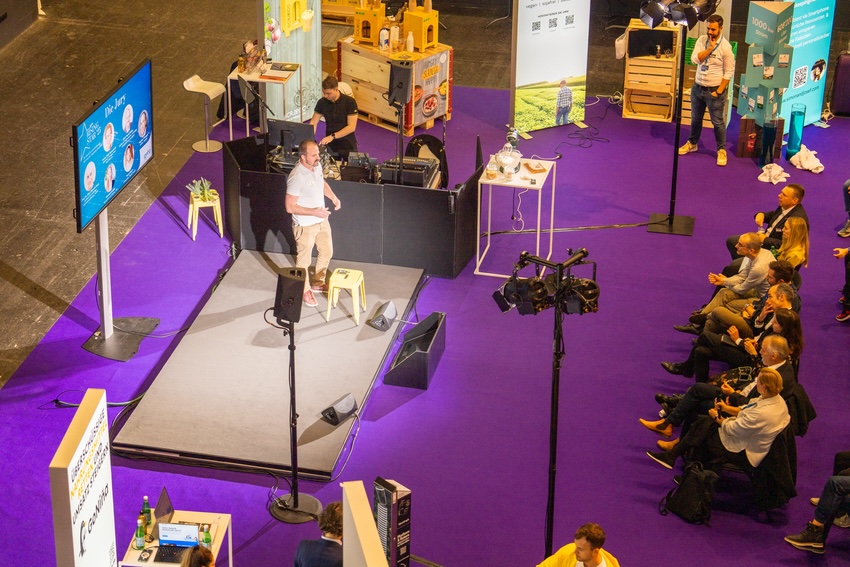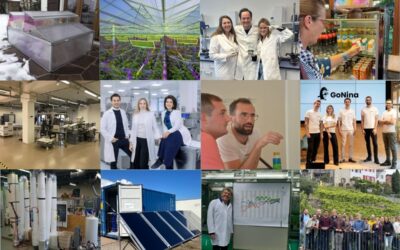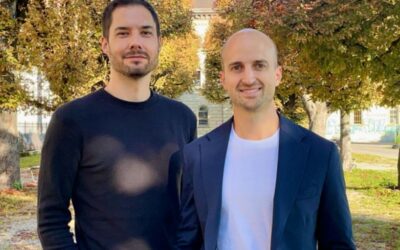Innovation in food systems requires...
Igeho Rising Star 2025: Public voting opens
Igeho Rising Star 2025: Public voting opens

Fifteen startups have been invited to present their innovations at Igeho 2025 in November in Basel. A public vote will now determine which five advance to the final, where they will face questions from the panel and audience, competing for the 2025 Igeho Rising Star Award.
The application phase for the 2025 Igeho Rising Star Award closed on 31 January, attracting numerous submissions from food tech startups. Each entry was carefully reviewed by the Igeho team based on innovation and use of technology, sustainability and environmental impact, as well as business model and scalability.
Fifteen Swiss startups have been selected to showcase their companies at Igeho 2025, where they will present their innovations to the audience in Basel this November. Benjamin Eulau, Igeho’s Brand Director, shared his excitement: ‘We saw some truly impressive innovations among the applications. Many of these startups have the potential to address long-term challenges in the food service industry.’
Christina Senn-Jakobsen, CEO of Swiss Food & Nutrition Valley, was also impressed by the applications submitted: “We were thrilled to hear that so many start-ups have applied to be part of the Igeho Rising Star Award 2025. From sustainable alternatives that offer consumers more diverse choices to tech-driven solutions that share the impact of what we put on our plates – so many Swiss ecosystem players are working tirelessly to create solutions that will make our food service sector more future-proof. I’m excited to watch them grow and scale through their participation in this competition.”
Public voting now open
The public vote to determine which five startups will compete for the 2025 Igeho Rising Star Award in the grand finale of Igeho 2025 opens today. Until 30 May, professionals from the hotel, restaurant, catering, and care industries can cast their votes for the startups they want to see in the final.
The selected startups are:
- Actidot
- catchfree
- Circunis
- FOOD2050
- Foodflows
- FoodFor
- GoNina
- Hexafed
- LOVYÜ
- Niatsu
- Sanvitafood
- Saya Suka
- SwissMiso
- TrueFoods
- Yumame Foods
Driving innovation through an award
As Switzerland’s leading international hospitality industry platform, Igeho is committed to fostering innovation. With the 2025 Igeho Rising Star Award, it provides emerging companies in the hospitality sector with a valuable opportunity to showcase their businesses, raise awareness of their innovations, and connect with industry professionals.
In collaboration with Swiss Food & Nutrition Valley, Igeho aims to use this award to drive innovation by offering startups a platform and facilitating networking opportunities. ‘We see it as our duty to give startups the chance to present themselves and step into the spotlight,’ says Benjamin Eulau, Igeho’s Brand Director. ‘The hospitality industry and our food system depend on long-term innovation, and we’re proud to support that.’
The grand finale of the 2025 Igeho Rising Star Award will take place at Igeho 2025 in Basel, where the five finalists will compete for the title, along with cash and non-cash prizes. All holders of valid day tickets are welcome to attend and be part of the live audience.
Igeho: International platform for the hotel, catering, take-away and care sectors
Igeho is the most important international industry platform for the hotel, catering, take-away and care sectors in Switzerland. As a live marketing platform it offers the hiospitality branch a comprehensive market overview, interesting networking opportunities and new impulses around the topic of hospitality. The wide range of products and services will be complemented by an exciting supporting programme on current trends and the most important topics in the hospitality industry. The next Igeho will take place at Messe Basel from November 15 to 19, 2025.
www.igeho.ch
Never miss a Swiss food innovation morsel.
Latest News
Five years of SFNV: Meet the faces behind the Valley
Five years of innovation: Six Swiss startups share their journeys
This year, Swiss Food & Nutrition...
FOOD FOUNDERS Studio raises CHF 1.2M, launches foodtech venture to address plant-based taste challenges
Two years after its founders set out...
Where food innovation takes root: finding the right space in Switzerland
Finding your first home base in...









